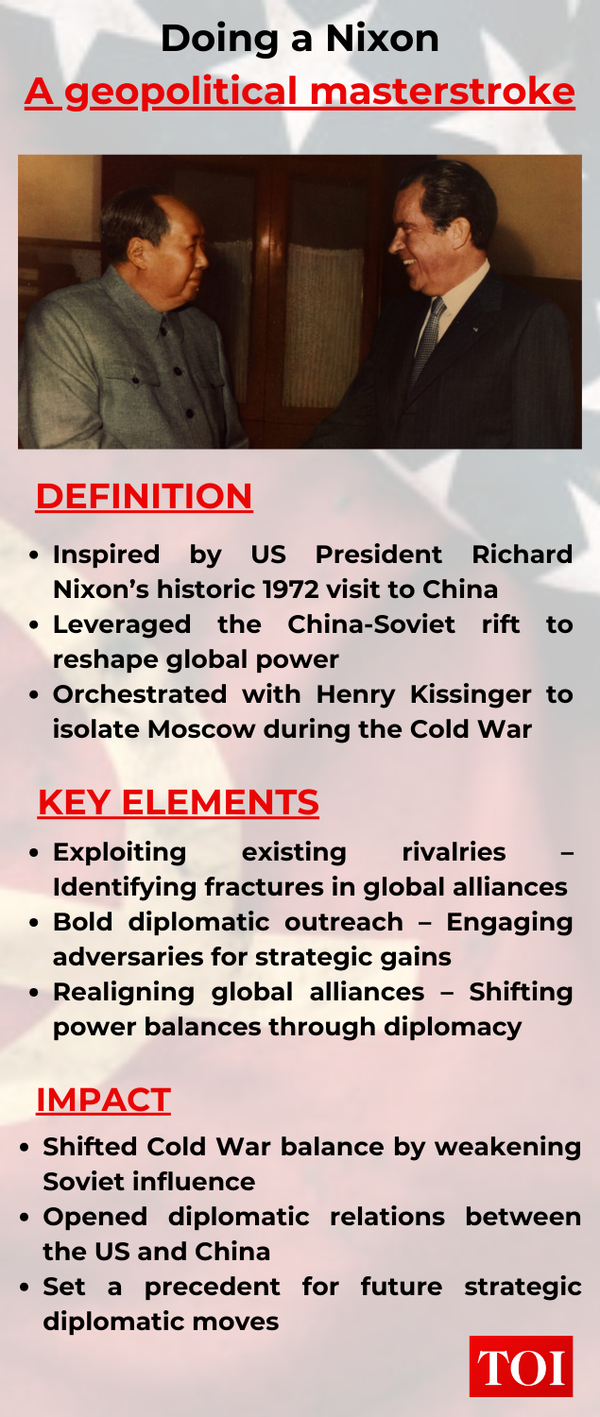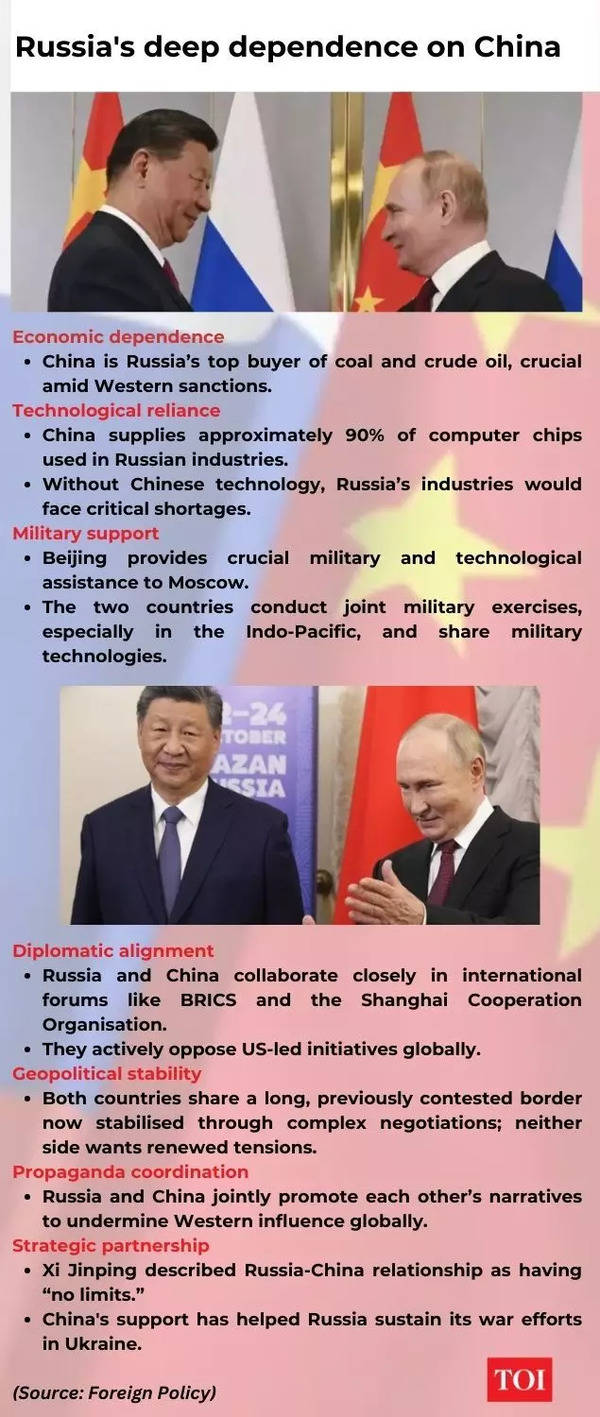As US President Donald Trump pushes to end the war in Ukraine through direct negotiations with Russia, observers are asking whether Trump’s overtures to Moscow might have a deeper strategic motive: to break apart the growing alliance between China and Russia, in what some are calling a “reverse Nixon.”
Driving the news
- Trump’s rapid pivot toward Russia, aimed at ending the nearly three-year war in Ukraine, has sidelined Kyiv and its European allies, who fear a peace deal made over their heads.
- Trump’s unexpected diplomacy has not only rattled Nato but is raising alarms in Beijing, too, where officials worry about the implications for China’s carefully nurtured alliance with Russia.
- Just weeks ago, Beijing seemed poised for a central role in Trump’s Ukraine peace strategy. Trump repeatedly floated the idea of leveraging China’s economic sway over Moscow to end the conflict—a move China would have welcomed as a chance to rebuild strained US-China ties and avert a potential trade war.
- But suddenly, China finds itself sidelined, neither a player in the negotiations nor seen as a global peacemaker, leaving Chinese officials scrambling.
Why it matters
China’s deepening strategic partnership with Russia under Xi Jinping is central to its broader ambition of countering Western influence and reshaping the international order. Xi’s careful cultivation of his “old friend” Vladimir Putin has helped Beijing secure vital energy supplies, military cooperation, and diplomatic backing in international disputes.
But Trump’s sudden rapprochement with Putin threatens to unravel Beijing’s years of strategic investment, raising fears that Washington might be attempting a “reverse Nixon”—mirroring Richard Nixon’s historic outreach to China in the 1970s to isolate the Soviet Union, this time isolating Beijing instead, a CNN report said.
Senior Chinese officials have privately expressed anxiety about Trump’s moves, coining the phrase, “only Trump goes to Moscow,” an echo of Nixon’s landmark 1972 trip to Beijing. If Trump’s strategy gains traction, it could isolate China geopolitically, limiting its global influence, and forcing Beijing to reconsider its strategic calculus in a rapidly changing world.
It’s not in Putin’s interest to be the little brother in a coalition with China.
US Vice-President JD Vance to Wall Street Journal

Today, the ghost of Nixon is haunting American foreign policy as well, thanks to the administration’s declared intention to strike a grand bargain with Russian President Vladimir Putin that would reorder global politics by sidelining the Europeans and leaving Kyiv in the cold.
An article in Foreign Policy titled ‘A Grand Bargain With Russia Would Be a Disaster’
Zoom in
- Trump’s approach seems clear: realign with Moscow to diminish Russia’s dependency on China, turning the tables on Beijing. Top US diplomat
Marco Rubio recently hinted at this approach, emphasizing potential “geopolitical and economic cooperation” between Washington and Moscow. Trump’s Ukraine envoy, Keith Kellogg, was even more explicit, saying the US aimed “to force” Putin into actions uncomfortable for Russia—including fracturing ties with China, as well as Iran and North Korea. - Yet experts remain skeptical that Trump can fully separate the Moscow-Beijing axis. The two nations have become tightly aligned economically and diplomatically, particularly since Russia’s invasion of Ukraine. Observers argue the Russia-China relationship is too deeply entrenched to break, given China’s vital role in supporting Russia’s economy and supplying critical goods under heavy Western sanctions.
- Still, even small cracks could have major implications. Yun Sun, director of the China Program at the Stimson Center, explained to CNN: “Even if it’s just 30% of a ‘reverse Nixon’… that’s going to sow the seeds of doubt.” Such doubts might make Xi question the solidity of the alliance he’s nurtured with Putin, shaking confidence at a crucial moment.

Between the lines
China’s immediate fear is less about losing Russia outright and more about becoming the sole focus of US containment efforts. A US-Russia peace deal in Ukraine would free American resources and attention to focus more directly on the Indo-Pacific and China’s rising influence—especially around Taiwan. Beijing’s strategist Yu Bin, from the Russian Studies Center in Shanghai, emphasized this fear in an interview to CNN, noting that “once Russia and the US patch up… that would free the Trump administration to turn its focus to China.”
The stakes are high for Xi, who for years has assiduously cultivated both a personal bond with his “old friend” Putin and his country’s relations with Russia – seeing his northern neighbor as a pivotal partner in a larger power struggle with the West. The Chinese leader took a calculated risk as Russian tanks rolled over the Ukrainian border three years ago. His choice not to condemn that invasion and have his country serve as Putin’s lifeline – lapping up Russian oil and supplying Moscow with key goods – lost Beijing the trust of Europe and galvanized American allies in Asia to work more closely with Nato.
An article in CNN titled ‘What China fears most about Trump’s turn toward Russia’
Indeed, US secretary of defense Pete Hegseth recently underscored this pivot in stark terms, asserting that America can’t prioritize European security when its primary strategic priority must be “deterring war with China.” Beijing is increasingly uneasy about being cornered in a two-front diplomatic squeeze: isolated from Europe, sidelined by the US, and uncertain about Russia’s future intentions.
Chinese and Russian relations are in a league of their own, they have a strong basis and strong institutional connections in the past decades … I don’t think either side would let that go because Trump is there for four years.
Yu Bin to CNN
What they’re saying
Publicly, Chinese officials have voiced support for US-Russia peace talks, with top diplomat Wang Yi saying, “China supports all efforts conducive to peace talks.” Yet behind closed doors, their anxiety is palpable. A senior Chinese foreign policy adviser told the Wall Street Journal that the US “wants to free the West from the endless war in Ukraine and then concentrate all its efforts on countering China.”
In a further twist, Ukrainian President Volodymyr Zelenskyy senses China’s newfound vulnerability and has indicated openness to involving Beijing in peace negotiations to pressure Putin. Zelensky commented, “It is important for us to engage China to help put pressure on Putin to end the war.” Such overtures are putting China in a diplomatic bind, forcing Beijing to consider whether maintaining a neutral façade is still strategically viable.
The big picture
- Trump’s pivot toward Russia isn’t just reshuffling European security; it’s also shaking the foundations of the global power dynamic, challenging established alignments. Unlike Nixon’s engagement with China—which took advantage of deep divisions between Beijing and Moscow—Trump is attempting something more difficult: creating fractures in a relatively solid Russia-China partnership.
- While Nixon exploited a bitter Sino-Soviet split that had erupted into armed conflict in 1969, today’s Russia-China relationship, though occasionally strained, is based on mutual strategic interests and interdependence. Moscow relies on China economically, especially after Western sanctions, while Beijing sees Russia as a key ally in countering the US-led global order.
- Yet Trump’s disruptive approach is still valuable even if a full rupture is unlikely. By introducing doubt into Beijing’s calculations, the US could force Xi to question Russia’s reliability. As Yun Sun suggests, in any future Taiwan crisis, “the Chinese will have to look at their back and wonder—what is Russia going to do?”
What’s next
- Beijing is now scrambling to recalibrate. Chinese officials are increasing diplomatic overtures to Europe, urging “all relevant parties and stakeholders” to be involved in Ukraine’s future, implicitly including China itself. Beijing’s next move might also involve participating in Ukraine’s post-war reconstruction to regain influence and credibility. Yet China’s worries about geopolitical isolation persist, intensified by the unpredictability of Trump’s foreign policy.
- Sari Arho Havren from London’s Royal United Services Institute told RFE/RL that Beijing would have preferred the US remain preoccupied with Ukraine, saying: “Continuing the Ukraine war would better serve Beijing,” keeping US attention divided and away from East Asia.
- Trump’s unpredictable diplomacy, however, has already scored a strategic point: it has made Beijing deeply uneasy. If the US can drive even minor wedges between Russia and China, or simply exploit existing doubts, Trump’s gambit could alter global dynamics in America’s favor.
- Meanwhile, Beijing faces a stark dilemma. Should it continue to trust Russia fully, or hedge against possible US-Russia rapprochement? The answer to that question may reshape not only the Ukraine conflict but global geopolitics in the coming decade.
(With inputs from agencies)
